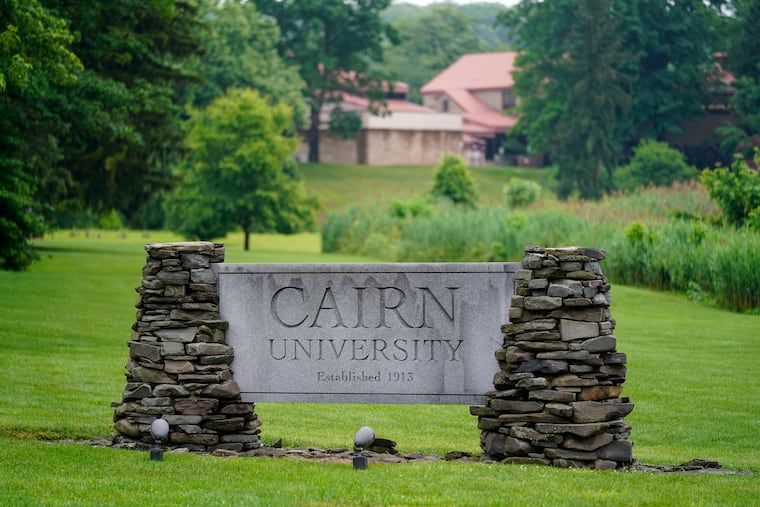Christian college outside Philly ends social work program, citing gender and sexuality guidelines
University officials say the national accrediting agency was attempting to impose values on sexuality and gender that don’t align with the school’s religious mission.

PHILADELPHIA — A small Christian university outside Philadelphia shuttered its highly regarded social work program partly because school officials say the accrediting agency was attempting to impose sexuality and gender values that don’t align with the university’s religious mission.
According to those officials, the decision by the Cairn University Board of Trustees on May 24 had been under consideration for almost a year because of funding and enrollment concerns. They say the accreditation language was only one factor.
But representatives from the accrediting body — the Council on Social Work Education — said its sexuality and gender language had not changed substantially in a recent draft accreditation, although the language addressing race and inclusion was updated. Council leaders said in a written statement they were concerned Cairn officials had misinterpreted the language, or had based the closure decision on a growing tide of conservative voices opposed to teaching theories reframing the history of race and racism.
The group's response took issue with Cairn President Todd Williams' statements alleging the council was trying to force programs to teach “a set of critical theory and intersectionality assumptions and values inconsistent with our biblical view of humanity, human nature, and the world.”
Cairn's mission is to “educate students to serve Christ in the church, society, and the world as biblically minded, well-educated, and professionally competent men and women of character," according to its website. The university in Langhorne, about 25 miles (40 kilometers) northeast of Philadelphia, has about 1,500 students.
The Council called Williams' statements about the language “false" and noted the draft highlighted the importance of equity and inclusion in the forming of someone’s identity.
Williams rejected the idea that the closing was based on the guidelines for race, saying racism and discrimination are inconsistent with his and the greater university's faith.
“It is unfortunate that that was put out there that way because it is absolutely not who we are,” Williams said.
“We identify as an evangelical institution, and we have standards of conduct that are based upon our beliefs. That is part of our understanding of our own faith but also on religious liberty. We don’t believe that it’s right to be engaged or to be involved in anything that is hateful or hurtful toward that (LGBTQ) community, or in any discrimination. But, we are a religious institution,” he said.
Williams' initial letter to students said he believed previous versions of the guidelines had language allowing for exceptions when a university's religious mission did not align with the document.
CSWE officials said there has never been an exception in its ethical guidelines. But they do allow universities to supplement the requirements with additional curriculum.
Cairn students and alumni who spoke to The Associated Press said they felt blindsided by the decision. The university had moved quickly, even removing the website to the social work school, they said.
The closure allows for a “teach-out” of the currently enrolled undergraduate students, meaning the about 50 students will finish the program with an accredited bachelor's degree. But the recently started master's program was immediately shuttered, leaving about two dozen students having to transfer to other universities.
Many of those students and alumni said they didn't believe Williams' statements were related to race. They also said they didn't see an issue separating their theological beliefs on sexuality and gender with the call to be social workers.
“If you are a well-trained social worker, you don’t need to let your theology get in the way of your social work or helping any population that you might disagree with on a theological level,” said Lizzie Walker, who graduated from the program in 2018. “I think my faith lines up really well with the mission to be a social worker, to meet people where they are.”
Johanna Byrd, executive director of the Pennsylvania chapter of the National Association of Social Workers, condemned the closure, saying the university seemed to be sending an incorrect message that social workers can't have or maintain their faith and do their jobs.
“There are a lot of Christian colleges that have social work programs, and this is the first one that has reacted to this by saying we’re going to close our social work school. We of course have concerns that could be part of a trend,” Byrd said, noting a failed push in Texas last year to allow social workers and others to decline to treat people based on their religious convictions about gender and sexuality.
"It would be really horrible if the profession of social work falls victim to this whole conversation about critical race theory, or to the misconception that you can't be Christian and do this job. That's absolutely untrue,” she added.
Student Melanie Crosscombe, who has another year before she graduates, said after the initial closure email citing the language on sexuality, she compared the draft with previous accreditation documents and found little difference.
“That section of the document has previously existed, and it doesn't say you have to subscribe to these beliefs but you have to understand them to be able to treat the whole person,” she said. “It's saying when a person comes to you they deserve to be understood and treated with human dignity and respect... that aligns very beautifully for me with the concept that people are made in the image of God and the worth someone has just from being human.”
Crosscombe said her biggest worry is for the classes below her and that they will miss out on the experience that has shaped so many people into social workers willing to take on hard and important work.
“That’s what is keeping me up at night,” she said.